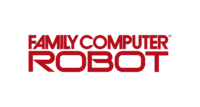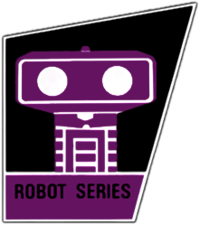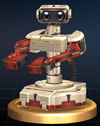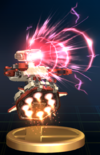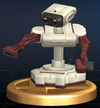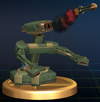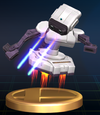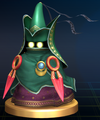R.O.B. (universe): Difference between revisions
| (143 intermediate revisions by 56 users not shown) | |||
| Line 1: | Line 1: | ||
{{ArticleIcons|ssbb=y|ssb4=y}} | {{Title|''R.O.B.'' (universe)}} | ||
{{ArticleIcons|ssbb=y|ssb4=y|ssbu=y}} | |||
{{Infobox Series | {{Infobox Series | ||
|title = | |title = R.O.B. (universe) | ||
|image = [[File: | |image = [[File:ROB series logo.png|200px]] | ||
|caption = [[File:ROBSymbol. | |caption = [[File:ROBSymbol.svg|50px|class=invert-dark]] | ||
|developer = [[Nintendo]] | |developer = [[Nintendo]] | ||
|publisher = Nintendo | |publisher = Nintendo | ||
| Line 16: | Line 17: | ||
|interwikipage = | |interwikipage = | ||
}} | }} | ||
The '''R.O.B. universe''' ( | The '''''R.O.B.'' universe''' ({{ja|ロボット|Robotto}}, ''Robot'') refers to the usage of the historically significant [[R.O.B.|Robotic Operating Buddy (R.O.B.)]] peripheral for the NES as a playable character in the ''Super Smash Bros.'' series. | ||
It was first represented in ''[[Super Smash Bros. Brawl]]'', with the peripheral appearing as both [[R.O.B. (SSBB)|a playable character]] and as [[R.O.B. Squad|a set of enemies]] in [[The Subspace Emissary]]. R.O.B. returns as an unlockable character in ''[[Super Smash Bros. 4]]'' and ''[[Super Smash Bros. Ultimate]]''. | |||
==Franchise description== | ==Franchise description== | ||
Roughly around the same time as Nintendo's domestic launch of its new video game console, the Famicom, in July 1983, one of the most infamous and historically | [[File:ROB series logo JPN.png|thumb|left|The logo for the Family Computer Robot]] | ||
The Family Computer Robot was created in July of 1985 as an experiment into the possibility of an external apparatus separate from the player controlling a video game. Two games were made for this peripheral; ''{{iw|wikipedia|Gyromite}}'' and ''{{iw|wikipedia|Stack-Up}}''. When necessary, the games will flash in a specific way that the robot will detect, triggering it to perform a desired action. The peripheral itself was a niche release in the Famicom aftermarket and, while selling decently well, did not initially have much of a cultural impact. However, its presence outside of Japan is its true claim to fame. | |||
Roughly around the same time as Nintendo's domestic launch of its new video game console, the Famicom, in July 1983, one of the most infamous and historically significant time periods in the video game industry's early timeline was at its height: the two year-long North American video game recession that began in 1983 and heralded the catastrophic end of the second generation of video gaming. The main causes of this crash are an oversaturation of competition spreading customers thin and a general lack of quality control standards leading to a flood of low quality software meant as quick cash grabs. Burned by these events, consumers simply stopped buying video games and the industry as a whole was collapsing. | |||
Around this time, Nintendo created a North American branch dubbed Nintendo of America to study the market and find a way to sell their product in such a turbulent era. The first order of business was to distance Nintendo from the stigma of video games, changing the luxurious Famicom into a toy-like aesthetic, selling it in the toy aisle of stores as the Nintendo Entertainment System. To further sell the idea that the system was a toy, some units of the console were bundled with the Zapper and the robot, now renamed to Robotic Operating Buddy ([[R.O.B.]] for short). The two games would also be released for the NES, though not in any console bundles. | |||
The | [[File:ROBFace.PNG|thumb|The logo for the Robot series of video games.]] | ||
''Gyromite'' was effectively a side-scrolling game where the controls were split between player-character movement on player 1's Control Pad and environmental effects on player 2's A and B buttons, making it a cooperative game, and R.O.B.'s contribution to ''Gyromite'' was effectively as an optional substitute for a second player, where pressing Start on player 1's controller would compel R.O.B. to press an appropriate button on the player 2 controller after going through roughly half a minute's worth of pre-programmed motions. ''Stack-Up'', on the other hand, fared better as software that used the R.O.B. unit itself as a physical game device, where electronically inputting commands with the NES controller would compel R.O.B. to move and drop colored blocks onto stands surrounding its base, though the pre-programmed motions of the R.O.B. unit often knocked blocks off their stands unintentionally. | |||
Analysts and historians argue that R.O.B. had a uniquely profound and important effect in the North American history of video games as a market, allowing Nintendo to turn an accessory that would otherwise be considered a commercial failure that was quickly abandoned into a type of Trojan horse product that put themselves in the good graces of the public and revived the North American video game market and helped it blossom into the multi-billion dollar industry it is today. How much of the early success of the NES is owed to R.O.B, however, is up for debate. | |||
Nintendo has shown itself to hold the R.O.B. unit in high regard, as evident by having it make a number of cameos and even a few playable appearances in a rather large number of its modern-day franchises. Its cameos consist of [[Kirby]] being able to collect its parts and reassemble them in a puzzle in ''{{iw|wikirby|Kirby's Dream Land 3}}'', several R.O.B.-centered microgames appearing throughout the ''{{iw|mariowiki|WarioWare}}'' series, a model of R.O.B. decorating a portion of [[Port Town Aero Dive]] in ''{{iw|fzerowiki|F-Zero GX}}'' (which also occurs in the stage of the same name in ''[[Super Smash Bros. Brawl]]''), R.O.B. appearing in the {{s|zeldawiki|Curiosity Shop}} in ''{{s|zeldawiki|The Legend of Zelda: Majora's Mask 3D}}'', R.O.B.'s head being [[pikipedia:Remembered Old Buddy|a collectable treasure]] in ''{{iw|pikipedia|Pikmin 2}}'', and R.O.B. appearing as on the back portion of the box art of [[Capcom]]'s ''Viewtiful Joe''. Its playable appearances consist of ''{{s|mariowiki|Mario Kart DS}}'', which marked its debut as a full-fledged video game character and even features a kart that resembles its ''Stack-Up'' accessories, and lastly and most notably, the ''Super Smash Bros.'' series as of ''Super Smash Bros. Brawl''. The recurring character in ''Gyromite'' and ''Stack-Up'' named Professor Hector has also made a few cameos like in ''Kirby's Dreamland 3'' and ''{{iw|harddropwiki|Tetris DS}}'', though he has not seen nearly as much representation as R.O.B. | |||
In addition to cameos and playable appearances, R.O.B. has been referenced in some instances, with the most notable of these occurring within the [[Star Fox (universe)|''Star Fox'' series]]. {{iw|lylatwiki|ROB 64}} references R.O.B. both in name and in function as a robotic assistant, due to his status as the pilot of the {{iw|lylatwiki|Great Fox}}. However, ''Star Fox Zero'' and ''Star Fox Guard'' both feature robots that are almost identical to R.O.B. ''Zero'' features Direct-i, who is tethered to the Gyrowing and functions similarly to ROB 64 and R.O.B. by being an assistant to the player. ''Guard'' features the A.T.K. Unit, which is one of the "combat class" robots in the game that threaten the player's mining facilities. Outside of these instances, ''StarTropics'' features a robot resembling R.O.B. named "NAV-COM", who is an important side character. | |||
==In ''[[Super Smash Bros. Brawl]]''== | |||
Since the ''R.O.B.'' universe only has two games to draw material from, it has minimal representation: it features one character, one [[item]] (produced by R.O.B's [[down special move]], [[Gyro]]), one music track, and no [[stage]]s. However, R.O.B. plays an integral role in [[Adventure Mode: The Subspace Emissary|Adventure Mode]], with several different R.O.B.s appearing as enemies. | |||
Due to not having any stages, R.O.B. uses [[Mario Bros.]] as his [[home stage]] in {{SSBB|Classic Mode}} and [[All-Star Mode]]. | |||
=== | ===Fighter=== | ||
*[[File:ROBIcon(SSBB).png|50px|right]]'''{{SSBB|R.O.B.}}''': R.O.B. is the only playable character in the R.O.B. universe. His moveset is | *[[File:ROBIcon(SSBB).png|50px|right|link=R.O.B. (SSBB)]]'''{{SSBB|R.O.B.}}''' ([[Unlockable character|Unlockable]]): R.O.B. is the only playable character in the ''R.O.B.'' universe. His moveset is largely original, although some of his moves are based on the real peripheral; for example, the flashing red light on R.O.B.'s head when his [[Robo Beam]] is charged is based on when the red light flashed to indicate that R.O.B. was ready for use with the NES. Once all characters are unlocked, on the character select screen R.O.B. is in the fourth column alongside the [[Ice Climbers]], [[Pit]] and [[Samus]], who all originated on the Famicom/NES and are also the only playable characters of their respective universes in ''Brawl'' (minus [[Zero Suit Samus]], who does not appear on the character select screen). | ||
===Music=== | |||
{{main|List of SSBB Music (Nintendo series)}} | |||
====Original Track==== | |||
*'''{{SSBBMusicLink|Nintendo|Gyromite}}''': A remix of the title theme of ''Stack-Up'', the game R.O.B. was packaged with. While ''Brawl'' mislabeled this track as being the background music from ''Gyromite'', there are some short tracks from ''Gyromite'' that are inserted into this remix. It is used on the ''Mario Bros.'' stage and is played during R.O.B.'s [[Character Roll Call]]. | |||
====Victory Theme==== | |||
*'''[[Victory theme#R.O.B. Victory Theme|Victory! R.O.B.]]''': Upbeat music derived from ''Stack-Up''{{'}}s background music. | |||
===Trophies=== | ===Trophies=== | ||
Trophies which feature R.O.B.s are: | Trophies which feature R.O.B.s are: | ||
[[File:R.O.B. - Brawl Trophy.png| | [[File:R.O.B. - Brawl Trophy.png|left|100px]] | ||
'''R.O.B.''' (Series: "Others". Unlock: Clear Classic Mode as R.O.B.)<br> | '''R.O.B.''' (Series: "Others". Unlock: Clear Classic Mode as R.O.B.)<br> | ||
''R.O.B. sporting his Famicom colors. R.O.B. debuted in Japan as Robot in 1985 as an add-on for the Famicom. He could be combined with a "gyro set," etc. for two types of play. The player controlled Professor Hector, the TV emitted light, and R.O.B. responded to the light by moving. At the time, it was epoch-making game play. Recently, R.O.B. appeared in Mario Kart DS.'' | ''R.O.B. sporting his Famicom colors. R.O.B. debuted in Japan as Robot in 1985 as an add-on for the Famicom. He could be combined with a "gyro set," etc. for two types of play. The player controlled Professor Hector, the TV emitted light, and R.O.B. responded to the light by moving. At the time, it was epoch-making game play. Recently, R.O.B. appeared in Mario Kart DS.'' | ||
{{Trophy games|console1=NES|game1=Nintendo Entertainment System Robotic Operating Buddy}} | {{Trophy games|console1=NES|game1=Nintendo Entertainment System Robotic Operating Buddy}}{{clr}} | ||
[[File:Diffusion Beam - Brawl Trophy.png|left|100px]] | |||
[[File:Diffusion Beam - Brawl Trophy.png| | |||
'''[[Diffusion Beam]]''' (Series: "Others". Unlock: Clear All-Star Mode as R.O.B.)<br> | '''[[Diffusion Beam]]''' (Series: "Others". Unlock: Clear All-Star Mode as R.O.B.)<br> | ||
''R.O.B.'s Final Smash. He emits a beam from his eyes that spreads across the spectrum and undulates in great variety as it travels. What makes this technique different is R.O.B.'s ability to move while using it. This allows him to use it in combination with his other moves to increase his Final Smash's effectiveness.'' | ''R.O.B.'s Final Smash. He emits a beam from his eyes that spreads across the spectrum and undulates in great variety as it travels. What makes this technique different is R.O.B.'s ability to move while using it. This allows him to use it in combination with his other moves to increase his Final Smash's effectiveness.'' | ||
{{Trophy games|console1=Wii|game1=Super Smash Bros. Brawl}} | {{Trophy games|console1=Wii|game1=Super Smash Bros. Brawl}}{{clr}} | ||
[[File:R.O.B. Sentry - Brawl Trophy.png|left|100px]] | |||
[[File:R.O.B. Sentry - Brawl Trophy.png| | '''[[R.O.B. Sentry]]''' (Series: The Subspace Emissary. Unlock: Use [[Trophy Stand]])<br> | ||
'''[[R.O.B. Sentry]]''' (Use Trophy Stand)<br> | |||
''A robot with a two-armed shot. This R.O.B. uses the booster on its base to propel its jumps. Often used in the Subspace Army bomb factory in defense or labor roles, the R.O.B. Sentry also works as a detonator. Its emotional capacity is unknown, but it has utter trust in the Ancient Minister and obeys him unwaveringly. This production model has been made in great numbers.'' | ''A robot with a two-armed shot. This R.O.B. uses the booster on its base to propel its jumps. Often used in the Subspace Army bomb factory in defense or labor roles, the R.O.B. Sentry also works as a detonator. Its emotional capacity is unknown, but it has utter trust in the Ancient Minister and obeys him unwaveringly. This production model has been made in great numbers.'' | ||
{{Trophy games|console1=Wii|game1=Super Smash Bros. Brawl}} | {{Trophy games|console1=Wii|game1=Super Smash Bros. Brawl}}{{clr}} | ||
[[File:R.O.B. Launcher - Brawl Trophy.png|left|100px]] | |||
[[File:R.O.B. Launcher - Brawl Trophy.png| | '''[[R.O.B. Launcher]]''' (Series: The Subspace Emissary. Unlock: Use Trophy Stand)<br> | ||
'''[[R.O.B. Launcher]]''' (Series: The Subspace Emissary. Unlock: Use | |||
''An upgraded R.O.B. model with a missile-launcher head that bolsters firepower. The standard coloring has also been refinished with a green and brown military motif, stylishly accented with a blue cord connecting the arm sections and base. This R.O.B. does not use its arms—attacks are limited to the missiles fired from its head.'' | ''An upgraded R.O.B. model with a missile-launcher head that bolsters firepower. The standard coloring has also been refinished with a green and brown military motif, stylishly accented with a blue cord connecting the arm sections and base. This R.O.B. does not use its arms—attacks are limited to the missiles fired from its head.'' | ||
{{Trophy games|console1=Wii|game1=Super Smash Bros. Brawl}} | {{Trophy games|console1=Wii|game1=Super Smash Bros. Brawl}}{{clr}} | ||
[[File:R.O.B. Blaster - Brawl Trophy.png|left|100px]] | |||
[[File:R.O.B. Blaster - Brawl Trophy.png| | '''[[R.O.B. Blaster]]''' (Series: The Subspace Emissary. Unlock: Use Trophy Stand)<br> | ||
'''[[R.O.B. Blaster]]''' (Series: The Subspace Emissary. Unlock:Use Trophy Stand)<br> | ''A R.O.B. model boasting robo-beam-blasting eye lenses suited for long-range combat. There are two types—one acts like a stationary gun, sitting in place and lining up targets, and the other is mobile. Actually, the R.O.B. Sentry also features beam-firing capabilities, but because the roles of the R.O.B. Squad are so well defined, there's no conflict between the ranks.'' | ||
''A R.O.B. model boasting robo-beam- blasting eye lenses suited for long-range combat. There are two types—one acts like a stationary gun, sitting in place and lining up targets, and the other is mobile. Actually, the R.O.B. Sentry also features beam-firing capabilities, but because the roles of the R.O.B. Squad are so well defined, there's no conflict between the ranks.'' | {{Trophy games|console1=Wii|game1=Super Smash Bros. Brawl}}{{clr}} | ||
{{Trophy games|console1=Wii|game1=Super Smash Bros. Brawl}} | [[File:Ancient Minister - Brawl Trophy.png|left|100px]] | ||
[[File:Ancient Minister - Brawl Trophy.png| | |||
'''[[Ancient Minister]]''' (Series: The Subspace Emissary. Unlock: Adventure Mode: The Subspace Emissary)<br> | '''[[Ancient Minister]]''' (Series: The Subspace Emissary. Unlock: Adventure Mode: The Subspace Emissary)<br> | ||
''The commander of the Subspace Army who uses Subspace Bombs to tear up [[World of Trophies|this world]]. He was once the lord of this world, living on the floating Island of the Ancients with many robots-but the robots were taken hostage on Tabuu's orders. Now that their home's a bomb factory, the robots carry out their functions while enduring deep sadness caused by the loss of their colleagues.'' | ''The commander of the Subspace Army who uses Subspace Bombs to tear up [[World of Trophies|this world]]. He was once the lord of this world, living on the floating Island of the Ancients with many robots-but the robots were taken hostage on Tabuu's orders. Now that their home's a bomb factory, the robots carry out their functions while enduring deep sadness caused by the loss of their colleagues.'' | ||
{{Trophy games|console1=Wii|game1=Super Smash Bros. Brawl}} | {{Trophy games|console1=Wii|game1=Super Smash Bros. Brawl}}{{clr}} | ||
[[File:Subspace Bomb - Brawl Trophy.png|left|100px]] | |||
[[File:Subspace Bomb - Brawl Trophy.png| | |||
'''[[Subspace Bomb]]''' (Series: The Subspace Emissary. Unlock: Clear Boss Battles on Easy difficulty)<br> | '''[[Subspace Bomb]]''' (Series: The Subspace Emissary. Unlock: Clear Boss Battles on Easy difficulty)<br> | ||
''A weapon that, when it explodes, draws every part of this world within its blast range into Subspace. The areas drawn into Subspace this way float about in bubbles as individual colonies. To detonate a bomb, two R.O.B.'s must be destroyed in the process. The Ancient Minister is bitterly aggrieved by this fact.'' | ''A weapon that, when it explodes, draws every part of this world within its blast range into Subspace. The areas drawn into Subspace this way float about in bubbles as individual colonies. To detonate a bomb, two R.O.B.'s must be destroyed in the process. The Ancient Minister is bitterly aggrieved by this fact.'' | ||
{{Trophy games|console1=Wii|game1=Super Smash Bros. Brawl}} | {{Trophy games|console1=Wii|game1=Super Smash Bros. Brawl}}{{clr}} | ||
===Stickers=== | ===Stickers=== | ||
| Line 104: | Line 109: | ||
|} | |} | ||
==In ''Super Smash Bros. 4''== | ==In ''[[Super Smash Bros. 4]]''== | ||
The R.O.B. series returns in '' | The ''R.O.B.'' universe returns in ''[[Super Smash Bros. 4]]'', though unlike in ''Super Smash Bros. Brawl'', its representation is very minimal: while R.O.B. retains his status as the universe's sole fighter, its one song from ''Brawl'' is exclusive to {{forwiiu}}. As a result, the ''R.O.B.'' universe is effectively akin to a "bonus" universe in ''SSB4'', much like how the {{uv|EarthBound}} and {{uv|F-Zero}} universes were in ''[[Super Smash Bros.]]'', and how the {{uv|Fire Emblem}} universe was in ''[[Super Smash Bros. Melee]]''. | ||
===Fighter=== | |||
*[[File:ROBIcon(SSB4-U).png|50px|right|link=R.O.B. (SSB4)]]'''{{SSB4|R.O.B.}}''' ([[Unlockable character|Unlockable]]): R.O.B. returns as a playable character, but has undergone some aesthetic and mechanical changes in the transition. The most notable examples are his design being much more inline with his real-life appearance (with his NES appearance now being his default appearance in Western releases), his KO potential being vastly improved, his zoning game being somewhat worsened, and Diffusion Beam being replaced by [[Super Diffusion Beam]]. Outside of these examples, his moveset has remained largely intact. | |||
===Music=== | |||
{{main|List of SSB4 Music (Nintendo series)}} | |||
====Returning Track==== | |||
*{{GameIcon|SSBB}}'''{{SSBUMusicLink|Nintendo|Stack-Up / Gyromite}}''': Returns from ''Brawl'' and is used on [[Wrecking Crew]]. | |||
====Victory Theme==== | |||
*'''[[Victory theme#R.O.B. Victory Theme|Victory! R.O.B.]]''': Upbeat music derived from ''Stack-Up''{{'}}s background music. Unchanged from ''Brawl''. | |||
===Trophies=== | |||
{{main|List of SSB4 trophies (R.O.B. series)}} | |||
Collectible trophies that appear in both the 3DS version and the Wii U version. | |||
==In ''[[Super Smash Bros. Ultimate]]''== | |||
The ''R.O.B.'' universe returns in ''Ultimate''. Once again, no new significant content is introduced. | |||
===Fighter=== | |||
*42. [[File:ROBIcon(SSBU).png|50px|right|link=R.O.B. (SSBU)]]'''{{SSBU|R.O.B.}}''' ([[Unlockable character|Unlockable]]): Returns as an unlockable fighter with a new Final Smash, [[Guided Robo Beam]], and a variety of buffs that have made R.O.B. a more potent and viable character. | |||
===Music=== | |||
{{main|List of SSBU Music (Other series)}} | |||
====Returning Track==== | |||
*{{GameIcon|SSBB}}'''{{SSBUMusicLink|Other|Stack-Up/Gyromite}}''': A medley of themes from ''{{iw|wikipedia|Stack-Up}}'' and ''{{iw|wikipedia|Gyromite}}'', including the Test theme and level theme from ''Gyromite'', and the title, Memory Mode, Direct Mode, and Bingo Mode themes from ''Stack-Up''. Returns from ''Brawl''. Heard in R.O.B.'s character trailer. | |||
====Victory Theme==== | |||
*'''[[Victory theme#R.O.B. Victory Theme|Victory! R.O.B.]]''': Upbeat music derived from ''Stack-Up''{{'}}s background music. Unchanged from ''Brawl'' and ''Smash 4''. | |||
=== | ===Spirits=== | ||
{{main|List of spirits (R.O.B. series)}} | |||
==Games with | ==Games and accessories with elements appearing in the ''Super Smash Bros.'' series== | ||
==='' | The ''R.O.B.'' universe has games and accessories represented throughout the ''Super Smash Bros.'' series with a total of 3 games and accessories. The latest game represented in this universe is ''{{iw|wikipedia|Gyromite}}'', released on August 13, 1985. | ||
===''[[R.O.B.]]''=== | |||
*Playable character: | |||
**{{GameIcon|SSBB}} The design for R.O.B in ''Smash'' is a mildly altered version of the original accessory. | |||
**{{GameIcon|SSBB}} The light at the top of R.O.B's head that flashes red when [[Robo Beam]] is charged is based on an identical light that flashes when R.O.B. is connected to an NES and ready for use. | |||
===''{{iw|wikipedia|Stack-Up}}''=== | |||
*Sticker: | |||
**{{GameIcon|SSBB}} R.O.B with blocks appears as a sticker. | |||
*Spirit: | |||
**{{GameIcon|SSBU}} R.O.B. with blocks appears as a spirit. | |||
*Music: | |||
**{{GameIcon|SSBB}} "'''{{SSBUMusicLink|Other|Stack-Up/Gyromite}}'''": A medley of tracks from this game and ''Gyromite''. Mislabled as '''Gyromite''' in ''Brawl''. | |||
===''{{iw|wikipedia|Gyromite}}''=== | |||
*Playable character: | |||
**{{GameIcon|SSBB}} [[Gyro]] is based on a top-like accessory used by R.O.B. for the game. | |||
*Spirit: | |||
**{{GameIcon|SSBU}} R.O.B. with gyros appears as a spirit. | |||
*Music | |||
**{{GameIcon|SSBB}} "'''{{SSBUMusicLink|Other|Stack-Up/Gyromite}}'''": A medley of tracks from this game and ''Stack-Up''. Mislabled as '''Gyromite''' in ''Brawl''. | |||
==Trivia== | ==Trivia== | ||
* The R.O.B. universe is the only universe | * The ''R.O.B.'' universe is the only universe that has a playable character but has never had a [[stage]]. | ||
* In ''Brawl'', R.O.B.'s Famicom color scheme is his default costume, while his gray-and-white NES color scheme is available as an [[alternate costume]]. In ''SSB4'' and ''Ultimate'', his NES color scheme is used as the default costume in American and PAL region releases (''SSB4'') or European [[language]]s (''Ultimate''). | |||
*The ''R.O.B.'' universe has the least amount of music of all universes represented by a playable character, with only one full track in the entire series. | |||
*The ''R.O.B.'' universe is the only primary universe introduced in ''Brawl'' to not have [[Assist Trophy]] representation. | |||
{{Universe}} | {{Universe}} | ||
{{R.O.B. universe}} | {{R.O.B. universe}} | ||
[[Category:R.O.B. universe|*]] | [[Category:R.O.B. universe|*]] | ||
[[es:R.O.B. (universo)]] | |||
Latest revision as of 22:03, October 29, 2024
| R.O.B. (universe) | |
|---|---|
 
| |
| Developer(s) | Nintendo |
| Publisher(s) | Nintendo |
| Genre(s) | Puzzle |
| Console/platform of origin | Nintendo Entertainment System |
| First installment | Stack-Up (1985) |
| Latest installment | Gyromite (1985) |
The R.O.B. universe (ロボット, Robot) refers to the usage of the historically significant Robotic Operating Buddy (R.O.B.) peripheral for the NES as a playable character in the Super Smash Bros. series.
It was first represented in Super Smash Bros. Brawl, with the peripheral appearing as both a playable character and as a set of enemies in The Subspace Emissary. R.O.B. returns as an unlockable character in Super Smash Bros. 4 and Super Smash Bros. Ultimate.
Franchise description[edit]
The Family Computer Robot was created in July of 1985 as an experiment into the possibility of an external apparatus separate from the player controlling a video game. Two games were made for this peripheral; Gyromite and Stack-Up. When necessary, the games will flash in a specific way that the robot will detect, triggering it to perform a desired action. The peripheral itself was a niche release in the Famicom aftermarket and, while selling decently well, did not initially have much of a cultural impact. However, its presence outside of Japan is its true claim to fame.
Roughly around the same time as Nintendo's domestic launch of its new video game console, the Famicom, in July 1983, one of the most infamous and historically significant time periods in the video game industry's early timeline was at its height: the two year-long North American video game recession that began in 1983 and heralded the catastrophic end of the second generation of video gaming. The main causes of this crash are an oversaturation of competition spreading customers thin and a general lack of quality control standards leading to a flood of low quality software meant as quick cash grabs. Burned by these events, consumers simply stopped buying video games and the industry as a whole was collapsing.
Around this time, Nintendo created a North American branch dubbed Nintendo of America to study the market and find a way to sell their product in such a turbulent era. The first order of business was to distance Nintendo from the stigma of video games, changing the luxurious Famicom into a toy-like aesthetic, selling it in the toy aisle of stores as the Nintendo Entertainment System. To further sell the idea that the system was a toy, some units of the console were bundled with the Zapper and the robot, now renamed to Robotic Operating Buddy (R.O.B. for short). The two games would also be released for the NES, though not in any console bundles.
Gyromite was effectively a side-scrolling game where the controls were split between player-character movement on player 1's Control Pad and environmental effects on player 2's A and B buttons, making it a cooperative game, and R.O.B.'s contribution to Gyromite was effectively as an optional substitute for a second player, where pressing Start on player 1's controller would compel R.O.B. to press an appropriate button on the player 2 controller after going through roughly half a minute's worth of pre-programmed motions. Stack-Up, on the other hand, fared better as software that used the R.O.B. unit itself as a physical game device, where electronically inputting commands with the NES controller would compel R.O.B. to move and drop colored blocks onto stands surrounding its base, though the pre-programmed motions of the R.O.B. unit often knocked blocks off their stands unintentionally.
Analysts and historians argue that R.O.B. had a uniquely profound and important effect in the North American history of video games as a market, allowing Nintendo to turn an accessory that would otherwise be considered a commercial failure that was quickly abandoned into a type of Trojan horse product that put themselves in the good graces of the public and revived the North American video game market and helped it blossom into the multi-billion dollar industry it is today. How much of the early success of the NES is owed to R.O.B, however, is up for debate.
Nintendo has shown itself to hold the R.O.B. unit in high regard, as evident by having it make a number of cameos and even a few playable appearances in a rather large number of its modern-day franchises. Its cameos consist of Kirby being able to collect its parts and reassemble them in a puzzle in Kirby's Dream Land 3, several R.O.B.-centered microgames appearing throughout the WarioWare series, a model of R.O.B. decorating a portion of Port Town Aero Dive in F-Zero GX (which also occurs in the stage of the same name in Super Smash Bros. Brawl), R.O.B. appearing in the Curiosity Shop in The Legend of Zelda: Majora's Mask 3D, R.O.B.'s head being a collectable treasure in Pikmin 2, and R.O.B. appearing as on the back portion of the box art of Capcom's Viewtiful Joe. Its playable appearances consist of Mario Kart DS, which marked its debut as a full-fledged video game character and even features a kart that resembles its Stack-Up accessories, and lastly and most notably, the Super Smash Bros. series as of Super Smash Bros. Brawl. The recurring character in Gyromite and Stack-Up named Professor Hector has also made a few cameos like in Kirby's Dreamland 3 and Tetris DS, though he has not seen nearly as much representation as R.O.B.
In addition to cameos and playable appearances, R.O.B. has been referenced in some instances, with the most notable of these occurring within the Star Fox series. ROB 64 references R.O.B. both in name and in function as a robotic assistant, due to his status as the pilot of the Great Fox. However, Star Fox Zero and Star Fox Guard both feature robots that are almost identical to R.O.B. Zero features Direct-i, who is tethered to the Gyrowing and functions similarly to ROB 64 and R.O.B. by being an assistant to the player. Guard features the A.T.K. Unit, which is one of the "combat class" robots in the game that threaten the player's mining facilities. Outside of these instances, StarTropics features a robot resembling R.O.B. named "NAV-COM", who is an important side character.
In Super Smash Bros. Brawl[edit]
Since the R.O.B. universe only has two games to draw material from, it has minimal representation: it features one character, one item (produced by R.O.B's down special move, Gyro), one music track, and no stages. However, R.O.B. plays an integral role in Adventure Mode, with several different R.O.B.s appearing as enemies.
Due to not having any stages, R.O.B. uses Mario Bros. as his home stage in Classic Mode and All-Star Mode.
Fighter[edit]
- R.O.B. (Unlockable): R.O.B. is the only playable character in the R.O.B. universe. His moveset is largely original, although some of his moves are based on the real peripheral; for example, the flashing red light on R.O.B.'s head when his Robo Beam is charged is based on when the red light flashed to indicate that R.O.B. was ready for use with the NES. Once all characters are unlocked, on the character select screen R.O.B. is in the fourth column alongside the Ice Climbers, Pit and Samus, who all originated on the Famicom/NES and are also the only playable characters of their respective universes in Brawl (minus Zero Suit Samus, who does not appear on the character select screen).
Music[edit]
Original Track[edit]
- Gyromite: A remix of the title theme of Stack-Up, the game R.O.B. was packaged with. While Brawl mislabeled this track as being the background music from Gyromite, there are some short tracks from Gyromite that are inserted into this remix. It is used on the Mario Bros. stage and is played during R.O.B.'s Character Roll Call.
Victory Theme[edit]
- Victory! R.O.B.: Upbeat music derived from Stack-Up's background music.
Trophies[edit]
Trophies which feature R.O.B.s are:
R.O.B. (Series: "Others". Unlock: Clear Classic Mode as R.O.B.)
R.O.B. sporting his Famicom colors. R.O.B. debuted in Japan as Robot in 1985 as an add-on for the Famicom. He could be combined with a "gyro set," etc. for two types of play. The player controlled Professor Hector, the TV emitted light, and R.O.B. responded to the light by moving. At the time, it was epoch-making game play. Recently, R.O.B. appeared in Mario Kart DS.
: Nintendo Entertainment System Robotic Operating Buddy
Diffusion Beam (Series: "Others". Unlock: Clear All-Star Mode as R.O.B.)
R.O.B.'s Final Smash. He emits a beam from his eyes that spreads across the spectrum and undulates in great variety as it travels. What makes this technique different is R.O.B.'s ability to move while using it. This allows him to use it in combination with his other moves to increase his Final Smash's effectiveness.
R.O.B. Sentry (Series: The Subspace Emissary. Unlock: Use Trophy Stand)
A robot with a two-armed shot. This R.O.B. uses the booster on its base to propel its jumps. Often used in the Subspace Army bomb factory in defense or labor roles, the R.O.B. Sentry also works as a detonator. Its emotional capacity is unknown, but it has utter trust in the Ancient Minister and obeys him unwaveringly. This production model has been made in great numbers.
R.O.B. Launcher (Series: The Subspace Emissary. Unlock: Use Trophy Stand)
An upgraded R.O.B. model with a missile-launcher head that bolsters firepower. The standard coloring has also been refinished with a green and brown military motif, stylishly accented with a blue cord connecting the arm sections and base. This R.O.B. does not use its arms—attacks are limited to the missiles fired from its head.
R.O.B. Blaster (Series: The Subspace Emissary. Unlock: Use Trophy Stand)
A R.O.B. model boasting robo-beam-blasting eye lenses suited for long-range combat. There are two types—one acts like a stationary gun, sitting in place and lining up targets, and the other is mobile. Actually, the R.O.B. Sentry also features beam-firing capabilities, but because the roles of the R.O.B. Squad are so well defined, there's no conflict between the ranks.
Ancient Minister (Series: The Subspace Emissary. Unlock: Adventure Mode: The Subspace Emissary)
The commander of the Subspace Army who uses Subspace Bombs to tear up this world. He was once the lord of this world, living on the floating Island of the Ancients with many robots-but the robots were taken hostage on Tabuu's orders. Now that their home's a bomb factory, the robots carry out their functions while enduring deep sadness caused by the loss of their colleagues.
Subspace Bomb (Series: The Subspace Emissary. Unlock: Clear Boss Battles on Easy difficulty)
A weapon that, when it explodes, draws every part of this world within its blast range into Subspace. The areas drawn into Subspace this way float about in bubbles as individual colonies. To detonate a bomb, two R.O.B.'s must be destroyed in the process. The Ancient Minister is bitterly aggrieved by this fact.
Stickers[edit]
| Name | Game | Effect | Characters |
|---|---|---|---|
| R.O.B. | Mario Kart DS | [Specials: Indirect] Attack +15 | R.O.B. |
| Robot & Blocks | Stack-Up | [Specials: Indirect] Attack +27 | R.O.B. |
| Robot | Mario Kart DS | [Energy] Attack +32 | R.O.B. |
In Super Smash Bros. 4[edit]
The R.O.B. universe returns in Super Smash Bros. 4, though unlike in Super Smash Bros. Brawl, its representation is very minimal: while R.O.B. retains his status as the universe's sole fighter, its one song from Brawl is exclusive to Super Smash Bros. for Wii U. As a result, the R.O.B. universe is effectively akin to a "bonus" universe in SSB4, much like how the EarthBound and F-Zero universes were in Super Smash Bros., and how the Fire Emblem universe was in Super Smash Bros. Melee.
Fighter[edit]
- R.O.B. (Unlockable): R.O.B. returns as a playable character, but has undergone some aesthetic and mechanical changes in the transition. The most notable examples are his design being much more inline with his real-life appearance (with his NES appearance now being his default appearance in Western releases), his KO potential being vastly improved, his zoning game being somewhat worsened, and Diffusion Beam being replaced by Super Diffusion Beam. Outside of these examples, his moveset has remained largely intact.
Music[edit]
Returning Track[edit]
 Stack-Up / Gyromite: Returns from Brawl and is used on Wrecking Crew.
Stack-Up / Gyromite: Returns from Brawl and is used on Wrecking Crew.
Victory Theme[edit]
- Victory! R.O.B.: Upbeat music derived from Stack-Up's background music. Unchanged from Brawl.
Trophies[edit]
Collectible trophies that appear in both the 3DS version and the Wii U version.
In Super Smash Bros. Ultimate[edit]
The R.O.B. universe returns in Ultimate. Once again, no new significant content is introduced.
Fighter[edit]
- 42. R.O.B. (Unlockable): Returns as an unlockable fighter with a new Final Smash, Guided Robo Beam, and a variety of buffs that have made R.O.B. a more potent and viable character.
Music[edit]
Returning Track[edit]
 Stack-Up/Gyromite: A medley of themes from Stack-Up and Gyromite, including the Test theme and level theme from Gyromite, and the title, Memory Mode, Direct Mode, and Bingo Mode themes from Stack-Up. Returns from Brawl. Heard in R.O.B.'s character trailer.
Stack-Up/Gyromite: A medley of themes from Stack-Up and Gyromite, including the Test theme and level theme from Gyromite, and the title, Memory Mode, Direct Mode, and Bingo Mode themes from Stack-Up. Returns from Brawl. Heard in R.O.B.'s character trailer.
Victory Theme[edit]
- Victory! R.O.B.: Upbeat music derived from Stack-Up's background music. Unchanged from Brawl and Smash 4.
Spirits[edit]
Games and accessories with elements appearing in the Super Smash Bros. series[edit]
The R.O.B. universe has games and accessories represented throughout the Super Smash Bros. series with a total of 3 games and accessories. The latest game represented in this universe is Gyromite, released on August 13, 1985.
R.O.B.[edit]
- Playable character:
 The design for R.O.B in Smash is a mildly altered version of the original accessory.
The design for R.O.B in Smash is a mildly altered version of the original accessory. The light at the top of R.O.B's head that flashes red when Robo Beam is charged is based on an identical light that flashes when R.O.B. is connected to an NES and ready for use.
The light at the top of R.O.B's head that flashes red when Robo Beam is charged is based on an identical light that flashes when R.O.B. is connected to an NES and ready for use.
Stack-Up[edit]
- Sticker:
- Spirit:
- Music:
 "Stack-Up/Gyromite": A medley of tracks from this game and Gyromite. Mislabled as Gyromite in Brawl.
"Stack-Up/Gyromite": A medley of tracks from this game and Gyromite. Mislabled as Gyromite in Brawl.
Gyromite[edit]
- Playable character:
 Gyro is based on a top-like accessory used by R.O.B. for the game.
Gyro is based on a top-like accessory used by R.O.B. for the game.
- Spirit:
- Music
 "Stack-Up/Gyromite": A medley of tracks from this game and Stack-Up. Mislabled as Gyromite in Brawl.
"Stack-Up/Gyromite": A medley of tracks from this game and Stack-Up. Mislabled as Gyromite in Brawl.
Trivia[edit]
- The R.O.B. universe is the only universe that has a playable character but has never had a stage.
- In Brawl, R.O.B.'s Famicom color scheme is his default costume, while his gray-and-white NES color scheme is available as an alternate costume. In SSB4 and Ultimate, his NES color scheme is used as the default costume in American and PAL region releases (SSB4) or European languages (Ultimate).
- The R.O.B. universe has the least amount of music of all universes represented by a playable character, with only one full track in the entire series.
- The R.O.B. universe is the only primary universe introduced in Brawl to not have Assist Trophy representation.
|
| |
|---|---|
| Fighter | R.O.B. (SSBB · SSB4 · SSBU) |
| Enemies | R.O.B. Squad (R.O.B. Blaster · R.O.B. Launcher · R.O.B. Sentry) |
| Other | Ancient Minister · Isle of the Ancients |
| Trophies, Stickers, and Spirits | Trophies (SSBB · SSB4) · Spirits |
| Music | Gyromite |
